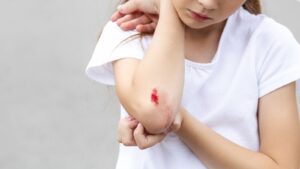Respiratory syncytial virus (RSV) is a common virus, particularly in the fall and winter months. Although RSV usually causes mild cold-like symptoms, it can be dangerous for infants, older adults, and people with weakened immune systems.
Protecting your family from RSV involves vaccination and preventive habits like good hygiene and limiting contact with those who are sick. Understanding how RSV spreads and identifying high-risk groups helps families stay prepared as RSV makes its seasonal appearance.
Awareness about RSV and its symptoms is key to early care and reducing severe illness. Knowing the options for protection, such as vaccines for pregnant women and antibody treatments for newborns, can make a big difference in keeping loved ones safe.
Understanding RSV and Protecting Your Family This Respiratory Season
What Is RSV?
Respiratory Syncytial Virus (RSV) is a common virus that infects the respiratory tract. It mainly causes cold-like symptoms but can become serious, especially for young children and older adults. The virus spreads easily and affects many people every year.
Symptoms of Respiratory Syncytial Virus
The first signs of RSV typically mimic a mild cold: runny nose, cough, sneezing, and sometimes fever. These symptoms usually pass within a couple of weeks for healthy individuals.
In infants and older adults, RSV symptoms can become severe. Watch for wheezing, difficulty breathing, rapid heart rate, feeding problems, unusual sleepiness, and persistent irritability. Fewer wet diapers may signal dehydration. Seek early medical attention for infants, older people, or anyone with underlying health conditions if symptoms get worse.
How RSV Spreads
RSV is highly contagious, spreading quickly from one infected person to another through droplets released by coughing or sneezing. The virus can be transferred through direct contact or when someone touches surfaces like toys and doorknobs contaminated with RSV.
RSV spreads quickly during the fall and winter in the United States, especially in schools and crowded places. Handling shared household items and poor hand hygiene increase the risk. Families can protect vulnerable members by washing hands regularly, disinfecting high-touch surfaces, and avoiding close contact with sick people.
Who Is Most at Risk
While RSV infects people of all ages, some groups face far greater risks for severe illness. Babies younger than two years old face the highest risk of serious breathing problems from RSV, especially if they were born prematurely or have weak immune systems.
Older adults, particularly those over 60, and people with chronic medical conditions like heart or lung disease, also face greater risks. Infants born prematurely or with weak immune systems are particularly vulnerable.
These groups may require special protections, such as vaccines or antibody treatments, to lower their risk during RSV season.
Prevention Strategies for Families
Families can reduce RSV risk with clear steps: good hygiene, cleaning, safe social habits, and vaccines for babies and older adults.
Effective Hygiene Practices
Handwashing is one of the best ways to prevent RSV. Family members should wash their hands with soap and water for at least 20 seconds, especially after touching shared surfaces or coming in from outside.
Covering coughs and sneezes with a tissue or elbow helps stop germs from spreading. Used tissues must be thrown away immediately. Avoid touching the face, especially the eyes, nose, and mouth, to reduce infection risk.
Teaching children to follow these habits is important. Hands should be washed before eating, after playing, and after coughing or sneezing. Using hand sanitizer with at least 60% alcohol is a good alternative when soap and water are not available
Household Cleaning Recommendations
Regular cleaning of surfaces stops RSV from spreading in the home. Focus on high-touch areas like door handles, light switches, phones, and toys. Use household disinfectants known to kill viruses.
Cleaning should be done daily during the RSV season or when someone is sick. Toys and shared items should be cleaned and disinfected more often, especially for babies and young children.
Laundry of bedding, blankets, and clothes should be washed in hot water and dried thoroughly. Cleaning helps remove germs that can linger on fabrics and surfaces.
Guidance on Social Interactions
Limiting close contact with sick individuals is very important during RSV season. Families should avoid large gatherings or crowded places, especially for infants or those with weak immune systems.
Visitors should wash their hands before holding a baby or touching shared surfaces. Sick household members should avoid close contact with more vulnerable relatives.
Avoid sharing cups, food, or utensils. Wearing masks around high-risk people can reduce the chance of virus spread if RSV is active in the community.
Immunization and Medical Options
Vaccines are now available for older adults and some high-risk groups to lower the chance of serious RSV illness. Those 65 and older or adults aged 50-74 with health risks should talk to their doctor about RSV vaccination.
For infants younger than 8 months, a monoclonal antibody treatment can protect them during their first RSV season, especially if they were born prematurely or have certain medical conditions.
Flu, COVID-19, and RSV vaccines can often be given during the same visit to simplify protection. Staying up to date with these shots is a key part of comprehensive RSV prevention for the whole family.
Managing Respiratory Syncytial Virus Infection at Home
Managing RSV at home involves watching symptoms closely and using simple care techniques to ease discomfort. Knowing when to get medical help can prevent complications. Basic home care methods support recovery and reduce symptom severity.
Recognizing When to Seek Medical Attention
It is important to notice warning signs that show RSV is becoming more serious. Seek medical help if a child or adult has fast or difficult breathing, bluish lips or face, or a high fever that does not improve with medication.
Other signs include:
- Severe coughing spells
- Trouble feeding or drinking
- Unusual sleepiness or irritability
- Fewer wet diapers than usual may indicate dehydration, especially in infants.
If a baby is struggling to breathe or shows any of these signs, immediate medical attention is needed. For adults with chronic conditions or weakened immune systems, worsening symptoms should also prompt a doctor visit.
Comfort Measures and Home Care Tips
Rest and fluids are key to feeling better when sick with the respiratory syncytial virus. Encourage frequent small drinks to prevent dehydration. Use a humidifier or cool mist vaporizer to ease breathing and clear nasal passages.
Over-the-counter pain relievers can reduce fever and discomfort. However, always follow dosing instructions and consult a healthcare provider for young children.
Keep the environment clean and avoid exposure to tobacco smoke. Hand washing is essential to stop the spread of the virus to others in the home.
Monitoring breathing and staying alert to any worsening signs helps manage RSV safely at home.
Our Urgent Care Walk-In Clinics in Omaha, Bennington, West Omaha, Rockbrook, Crossroads & Bellevue, NE
Our staff works to provide prompt, personal, and professional care for all of our patients. We strive to provide the attention patients need in as quick a time as possible. Urgent Care Clinics in Omaha & Bellevue, Nebraska, has three locations in the Omaha metropolitan area. Our three walk-in clinics are:
- Rockbrook Urgent Care
- Crossroads Urgent Care
- Bellevue Urgent Care
- West Omaha Urgent Care
- Bennington Urgent Care
Disclaimer
The information contained on this webpage is for educational purposes as well as to provide general information and a general understanding of the pertinent medical issue, only, not to provide a specific diagnosis. This information is not intended to be a substitute for professional medical advice. By using this blog/website, you understand there is no doctor-patient relationship between you and the blog/website publisher. The information included on this site should not be used as a substitute for medical advice from a licensed medical professional in your state. Neither Urgent Care Network, its subsidiaries, affiliates, assignees, or successors in interest, nor any other party assumes liability for loss or damage due to reliance on the content of this blog/website. If you are experiencing a severe medical issue, you should seek emergency assistance immediately.







